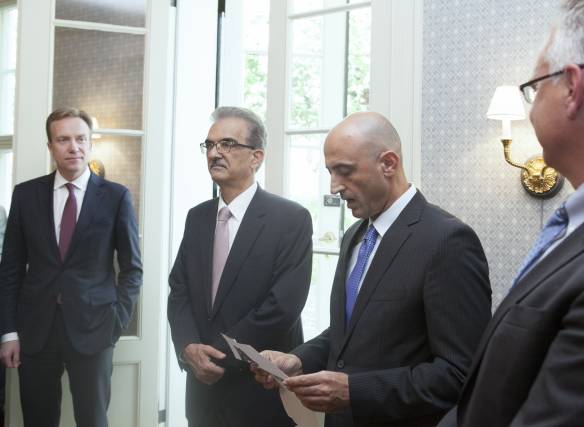These days, the Business for Peace Symposium is happening in Oslo. Business leaders from all over the world are gathered to discuss how business can contribute to peace and hinder conflict. Some of the most distinguished guests have arrived from Cyprus, namely Manthos Mavrommatis, Honorary President of the Cyprus Chamber of Commerce and Industry and Vargin Varer, Vice President of the Turkish Cypriot Chamber of Commerce.
The Cyprus issue is currently at its most critical conjuncture for at least a decade. It is indeed only the second time in 40 years that the prospects of a solution might actually be in the horizon. Although the stakes are very high and maneuvers required are very delicate, there is hope of a solution, for a number of reasons, including: unprecedented political will domestically; tangible interest and active involvement by foreign powers, including the EU and the US; regional geopolitical realities, including energy, forming a favourable climate; and economic realities, including the economic crisis, warranting pragmatism and thinking outside the box.

The vice presidents of the chambers of commerce in Cyprus, together with the Norwegian Minister of Foreign Affairs, Mr. Børge Brende (on the left).
This forward thinking, realism in evaluating economic realities and prospects, as well as critical revisiting of the fundamental premises of conflict and prospects of cooperation are best epitomized on the island by the business communities. Institutionally and personally, businesses and businessmen on both sides of the divide have been very active in undertaking initiatives or participating in existing ones, introducing and promoting a fresh, innovative look at the Cyprus issue and the prospects of a solution based on a spirit of cooperation and understanding.
To this effect, the Chambers of Commerce and Industry from both sides engaged in late 2013 in an initiative under the title “What if?” with a view to introducing to the Greek Cypriot and Turkish Cypriot public mutually beneficial aspects of a potential solution to the Cyprus issue. In the same cooperative spirit, the Presidents of the Chambers led a 35-strong delegation of the most established businessmen on the island to Brussels, in March 2014, to participate and contribute to the “The Cyprus Peace Dividend Revisited: A Productivity and Sectoral Approach” project and conference. The research project, undertaken by PRIO and funded by the Ministries of Foreign Affairs of Sweden, Denmark, Finland and Norway, reflects an attempt to put a figure on what a solution of the Cyprus problem would be worth, both for the economy as a whole and for different sectors. To this end, the economists commissioned have been looking at different sectors, from tourism to banking and from industry to oil and gas, to assess how they might benefit from a solution.
The closed meeting, attended also by the Greek Cypriot and Turkish Cypriot Chief Negotiators, was both primarily addressing the business communities and at the same time could not have been successful without their active participation and feedback. In the framework of the meeting and chiefly as a result of it, the Presidents of the Chambers of Commerce embraced the proposal to lead the businessmen in the adoption of a Joint Statement. In it, they affirmed their conviction that a solution of the Cyprus problem will benefit all sectors of the economy and will bring gains for Cypriots on both sides of the island, bringing significant growth to companies and creating jobs for many of the unemployed. The business leaders also re-affirmed their aim to support the efforts of the negotiators and to complement the excellent work already being undertaken by the Chambers, planning for a united Cyprus. The concluding words of the statement best capture the essence and power of the vision: “As business leaders, we know that when an opportunity presents itself, it must be grasped with both hands, carefully nurtured and planned in detail. Let us grasp that opportunity for Cyprus”.
In this long-standing and in many ways established crisis, progress and eventually the solution will come from forward-looking, original, courageous and pragmatic institutions and individuals with a vision, like the ones making up the business communities. The current leaders, in their institutional and personal capacities embody this very spirit and represent this very approach. Recognizing them for what they have achieved but also what they can potentially accomplish, if supported, would be of tremendous actual and symbolic value: It would reward, in their face, all important work completed to the day; it will encourage further such vital efforts and support and empower those committed to the achievement of a fair solution to the Cyprus issue; and it will serve as an excellent example for such initiatives to inspire similar ones in comparable situations elsewhere.
Kristian Berg Harpviken, Director of PRIO
Harry Tzimitras, Director of PRIO Cyprus Centre